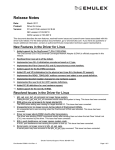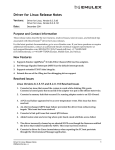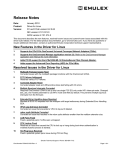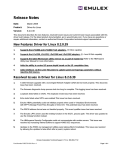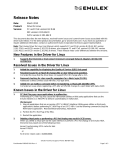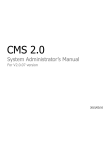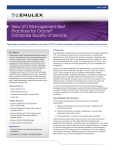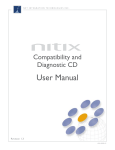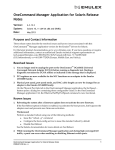Download Release Notes
Transcript
Release Notes Date: Product: Version: September 2010 Driver for Linux FC and FCoE versions 8.2.0.76 and 8.2.8.45 NIC version 2.102.348.0 iSCSI version 2.102.348.0 This document describes the new features, resolved known issues and current known issues associated with this driver build release. For the latest product documentation, go to www.Emulex.com. If you have any questions or require additional information, contact an authorized Emulex technical support representative. New Features in the Driver for Linux 1. Adds support for Emulex OneSecure adapters. 2. Adds the lpfc_suppress_link_up parameter. Adds support for this parameter. Resolved Issues in the Driver for Linux 1. Resolves failure of the unreg vpi mailbox command. 2. Resolves hang on link transitions. 3. Driver no longer crashes when els reject data is formed. 4. Driver no longer hangs on adapter resets. 5. Driver no longer hangs on the SGI IA64 platform. 6. Reduces the hba_queue_depth of an SLI4 UCNA to account for XRIs reserved for ELS commands. 7. Resolves illegal state transitions after devloss timeout. 8. Driver only sends ADISCs to targets. 9. Added support for SLER errors. Known Issues in the Driver for Linux NOTE: Known issues not specified with a FC/FCoE version or SLES/RHEL reference are applicable to both FC/FCoE versions. 1. PCI Hot Plug may cause applications to malfunction. Performing a PCI Hot Plug may cause the OneCommand Manager application (HBAnyware utilities or third party applications) that use the Emulex libraries (i.e. HBAAPI) to behave unpredictably or malfunction. Workaround: 1. Stop all applications that are accessing LPFC's HBAAPI interface (HBAnyware utilities or third party applications) before performing PCI Hot Plug of an LPFC adapter. Use the following command to stop the OneCommand Manager application: #/usr/sbin/hbanyware/stop_ocmanager 2. Perform the PCI Hot Plug of the adapter. 3. Restart the application. Emulex Technical Support / Phone: 800-854-7112 Part Number P006129-01A Rev. A Page 1 of 4 2. Deleting virtual ports or performing a PCI Hot Unplug may result in SCSI errors. When you delete a virtual port via the sysfs interface or perform a PCI Hot Unplug of an Emulex adapter, the kernel may report one of the following errors: kernel: Synchronizing SCSI cache for disk kernel: FAILED or SCSI error: return code = 0x00010000. 3. 4. 5. Workaround: These messages do not indicate a functional failure and can be ignored. LILO Boot Loader is not supported for i386 and x86_64 architectures. The LILO Boot Loader on i386 and x86_64 architectures is not supported for this driver stream. After the LILO boot loader is used, the LPFC driver package is installed and upon a reboot, an incorrect initial ramdisk will be used. The system might not boot correctly. Workaround: Use the GRUB Boot Loader. GRUB works correctly with the driver package's installation script. GRUB is the default boot loader of most of the Linux distributions. LILO is an older boot loader used on i386 and x86_64 architectures only. On SLES 10 and SLES11 systems, there is a possible problem with the LPFC module order in the INITRD_MODULES list. If another SCSI driver such as aic79xx, is loaded immediately after the LPFC driver through the initrd image, an interruption might occur in the SCSI mid-layer discovery process on the LUNs connected to LPFC’s Fibre Channel. This interruption can prevent the release of the SCSI discovery reference count and the LPFC driver cannot unload. Workaround: Do not add SCSI drivers immediately after the LPFC module in the INITRD_MODULES list. FC and FCoE versions 8.2.0.76, issue with attempting to suspend to disk and resume the system. An issue exists when you attempt to use the following command to suspend and resume the system: #echo disk > /sys/power/state The LPFC driver does not support this parameter and will encounter a kernel Oops. Workaround: Do not attempt to use this sysfs parameter when the LPFC driver is loaded. 6. Verify there is no outstanding I/O before deleting vports while devices are in use. While Emulex provides management utilities to enable you to delete virtual ports, the LPFC driver cannot detect whether devices accessed through a virtual port are in use. You can delete a virtual port even when devices accessible through the virtual port are mounted or when I/O is outstanding to the device. If file systems are mounted on a virtual port and that virtual port is deleted, the file systems still appear to be mounted but are not be accessible. Workaround: Before deleting virtual ports, prepare the system affected by unmounting all the devices accessible through the virtual ports, and verifying that there is no outstanding I/O. 7. 4 Gb/s HBAs in virtualized environments that use Direct I/O or SFPT can fail to initialize. Default driver configuration fails to initialize 4 Gb/s adapters in virtualized environments that use Direct I/O or SFPT(Storage Fixed Pass through) .This may result in a system hang or uninitialized LPFC adapter in Intel VT-d and AMD-V IOMMU systems. Workaround: Load the LPFC driver with the following driver parameters set: lpfc_hostmem_hgp=1 lpfc_sli_mode=2 For example: # modprobe lpfc lpfc_hostmem=1 lpfc_sli_mode=2 Note: A side effect of this workaround is that virtual ports are no longer be supported by the LPFC driver when the lpfc_sli_mode parameter is set to 2. Emulex Technical Support / Phone: 800-854-7112 Part Number P006129-01A Rev. A Page 2 of 4 8. FC and FCoE versions 8.2.0.76, an error message may be displayed during the driver kit removal process. As part of the driver kit removal process initiated via the "lpfc-install -u" command, the previous in-box LPFC driver version (driver version part of the Linux distribution), which was saved as part of the current driver kit install process, is restored and becomes the active driver. However, the driver kit un-installation process by design does not remove any entries in the Linux distribution configuration file (modprobe.conf). As such, parameters that would have been valid for the just-removed driver version and entered in the modprobe.conf file load the just-restored in-box driver version. This could create problems though, when the just-removed driver version includes module parameters that did not exist in the older just-restored driver version, and one or more of these module parameters are included in the configuration file (modprobe.conf). In this case, an error message is displayed during the uninstallation process of the driver kit, such as: Loading LPFC Driver .FATAL: Error inserting lpfc (/lib/modules/<kernel_revision>/kernel/drivers/scsi/lpfc/lpfc.ko): Unknown symbol in module, or unknown parameter (see dmesg) An example of this issue is if you uninstalled an 8.2.0.3x driver kit which had DH-CHAP functionality enabled on a Linux distribution with an older 8.1.10.x in-box driver version. Workaround: Edit the Linux configuration file (modprobe.conf) and remove all LPFC driver module parameters that start with: options lpfc ... then attempt to uninstall the driver kit again. To find the module parameters supported by the LPFC driver module: # modinfo <driver_dir>/lpfc.ko 9. The lspci utility shows “Unknown Device” for a OneConnect UCNA. On RHEL5.3/RHEL5.4/RHEL5.5 and SLES10-SP2/SLES10-SP3 distribution kernels, the lspci utility incorrectly identifies the OCe10100 OneConnect Universal CNA as an “Unknown Device”. On the SLES 11 distribution kernel, the lspci utility incorrectly identifies the OCe10100 OneConnect Universal CNA as an unknown “Device 0704”. Workaround: There is no workaround at this time. 10. An FCF failover issue may cause SCSI connection loss or interruption. If you are running NPV mode with Cisco Nexus 5000 series FCoE switch firmware version 4.1(3)N2(1) or earlier, you may lose or interrupt the SCSI connections with Emulex OneConnect UCNAs. The switch incorrectly sends out a Discovery Advertisement to All-ENode-MACs from the FCF MAC with which the FC uplink was down. The UCNA may hang on to an offline FCF or experience back-to-back FCF failover and it could lead to a Linux SCSI mid-layer devloss timeout. To solve this problem, upgrade the Cisco Nexus 5000 series FCoE switch firmware to 4.2(1)N1(1) or later. Workaround: If you choose not to upgrade, increase the FC transport dev_loss parameter to 60 seconds. You can increase this parameter one of two ways: o Update the FC transport dev_loss_tmo parameter: Example: # echo 60 > /sys/class/fc_remote_ports/rport-3:0-1/dev_loss_tmo o Update the LPFC driver's lpfc_nodev_tmo parameter: Example:# echo 60 > /sys/class/scsi_host/host3/lpfc_nodev_tmo 11. Inband management connection loss during an FCF failover with a Brocade FC switch. During FCF failover from one FC uplink to another in configurations with a Cisco FCoE switch in NPV mode and Brocade DCX Director FC switch with firmware 6.1.1a, it has been observed there can be cases where the OneConnect UCNA symbolic node names of the FCoE UCNA interfaces involved in the FCF failover could disappear. This is observed from the OneCommand Management application, where the inband communication from one of the UCNAs to the other involved in the FCF failover is lost. Workaround: There is no workaround at this time. Emulex Technical Support / Phone: 800-854-7112 Part Number P006129-01A Rev. A Page 3 of 4 12. FC and FCoE versions 8.2.8.45, targets or devices not visible on the SLES11 operating system if the interrupt mode is set to INTx. It was found that if the SLES11 operating system is running on some server platforms, the INTx interrupt mode operation is not compatible with Emulex adapters. The default interrupt mode for the LPFC driver is INTx, but when running on some systems with the SLES11 operating system, this interrupt mode does not operate correctly. This issue has been observed on PCI-X and PCIe x4 slots only. The symptom of this issue is that no targets or devices are seen through the FC adapters and the following message is posted on the /var/log/messages file by the LPFC driver: "Mailbox command x33 timedout". Workaround: Do one of the following: • If there are no PCI x adapters in the system and there are enough x8 slots, move all Emulex PCIe cards to the x8 slots. • 13. Use MSI instead of INTx interrupt mode for the LPFC driver. To do this, set the LPFC driver lpfc_use_msi parameter to 2. For more information on how to set the LPFC driver module parameter, refer to the Driver for Linux User Manual. FC and FCoE version 8.2.8.45, if authentication is enabled a system boot or adapter reset may disable the port. An issue exists when authentication is enabled and the host is connected to a Cisco switch with firmware rev 3.1(3a). After a system boot or an adapter reset, the switch may detect a false authentication failure and disable the port. Workaround: Disable and re-enable the port. 14. FC and FCoE version 8.2.0.76, NIC driver installation using the rpm command in RHEL5.5 may fail. NIC driver installation using the rpm command fails in RHEL5.5 because of failed dependencies for some GRO functions that are missing from the Red Hat whitelist. Workaround: Install the driver using the --nodeps option in the rpm command. Copyright © 2003-2010 Emulex. All rights reserved worldwide. No part of this document may be reproduced by any means or translated to any electronic medium without the prior written consent of Emulex. Information furnished by Emulex is believed to be accurate and reliable. However, no responsibility is assumed by Emulex for its use; or for any infringements of patents or other rights of third parties which may result from its use. No license is granted by implication or otherwise under any patent, copyright or related rights of Emulex. Emulex, the Emulex logo, AutoPilot Installer, AutoPilot Manager, BlockGuard, Connectivity Continuum, Convergenomics, Emulex Connect, Emulex Secure, EZPilot, FibreSpy, HBAnyware, InSpeed, LightPulse, MultiPulse, OneCommand, OneConnect, One Network. One Company., SBOD, SLI, and VEngine are trademarks of Emulex. All other brand or product names referenced herein are trademarks or registered trademarks of their respective companies or organizations. Emulex provides this manual “as is” without any warranty of any kind, either expressed or implied, including but not limited to the implied warranties of merchantability or fitness for a particular purpose. Emulex may make improvements and changes to the product described in this manual at any time and without any notice. Emulex assumes no responsibility for its use, nor for any infringements of patents or other rights of third parties that may result. Periodic changes are made to information contained herein; although these changes will be incorporated into new editions of this manual, Emulex disclaims any undertaking to give notice of such changes. Emulex, 3333 Susan Street Costa Mesa, CA 92626 Emulex Technical Support / Phone: 800-854-7112 Part Number P006129-01A Rev. A Page 4 of 4




